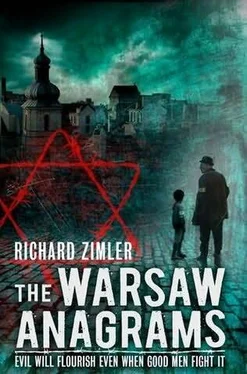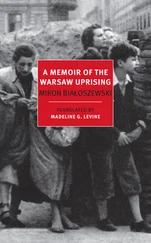‘You could have paid Mikael already,’ I observed.
He took a long sip of ersatz coffee out of my cup, then said, ‘He told me not to – not until he had the serum. So he hasn’t seen the envelope yet.’
‘What are you two talking about?’ my niece called out from her room.
When I explained to her that we’d soon have the serum, she announced, ‘No one is injecting me with anything!’ Her voice was strong, but she gave herself a coughing fit and got bloody phlegm on her sheets.
‘I didn’t risk my life so you could put up a fuss,’ Izzy told her as I fetched a hand-towel from her wardrobe.
‘How did you risk your life?’ she asked, squinting suspiciously.
I glared at Izzy to keep the truth hidden, but he’d already figured that out. ‘Every outing with your uncle puts me in danger of a fatal moral decline,’ he said dryly.
‘Go away!’ she told him nastily. ‘And you, too!’ she added, turning to me.
The next morning, I awoke just after dawn, eager to speak to Anna’s friends before heading to Mikael’s office. Stefa looked fast asleep when I tiptoed into her room, so I turned round, which was when she spoke, making me jump.
‘I’m up,’ she said in a drowsy voice.
She dared open her eyes only a sliver; the light streaming through the window made her head throb. She instructed me to look for a small book with a leather cover in the top drawer of her dresser. Once I’d found it, she had me open it to the first page. Written in her neat square handwriting – in Polish – was the following:
Adam Liski
Birth: 4 August 1932.
Weight: Seven pounds four ounces.
Length: Nineteen inches.
Glued near the bottom of the page was a sprig of her son’s downy blond hair. On subsequent pages, I discovered records of his childhood diseases and medical treatments, as well as drawings of his hands and feet, and a portrait of him that she’d done when he was five. She had artistic talent – who would have guessed? Among a series of old sketches of her husband Krzysztof, I also discovered – to my surprise and delight – that she’d drawn me huddled over a book. I was smoking the meerschaum pipe I’d inherited from my father. She must have done it about ten years before. Had I really ever looked that strong and young?
‘Uncle Erik,’ she pleaded, ‘you have to hold on to Adam’s record book for me.’
‘Me? Why?’
‘Just do what I say for once!’
‘All right, I’ll keep it safe. But you’re going to be fine. You just need to stay warm.’
‘Hide it!’ she said in a hushed whisper, as if the Germans would need to know Adam’s height to win the war.
‘I’ll put it under the mattress in my room,’ I told her, but once I was out of sight I slipped it into my coat pocket instead.
I sat with Stefa for a time, smearing schmaltz on her chapped lips and combing the tangles out of her hair. She declined my offer of borscht.
‘Listen, Ewa has been helping me write cards to our friends outside the ghetto,’ she told me. ‘We’re going to have a courier post them on the Other Side.’
‘Why are you sending notes?’
‘Our friends need to know about… about things with us,’ she replied, unwilling to speak Adam’s name. ‘Is there anyone you want me to write to?’
I thought about that. ‘No, thanks. I wouldn’t know what to say.’
I told my niece I had to go out for a while but would ask Ewa to check on her from time to time. Down in the bakery, the young woman promised me she’d do just that.
I was too exhausted to walk anywhere, so I splurged on a rickshaw. My driver was a former chemical engineer named Józef. He wore a red velvet vest under a high-collared russet coat. ‘My daughter made them for my birthday,’ he told me.
When I replied that she was a genius with a needle and thread, he turned away from me as if I’d offended him, but I didn’t ask why; everyone in the ghetto kept a misery on his shoulder that could easily justify odd behaviour.
Though Józef pedalled hard, the younger competition passed us. I spent the journey across town looking through Adam’s record book. Near the end, I discovered lists that Stefa had made of the advantages and disadvantages in the personalities of her friends. I’d never known that she’d been a list-maker, but it didn’t surprise me.
I remember Izzy’s inventory better than all the others because it showed off my niece’s wit.
Advantages: Perfectly manicured hands, delights in his own humour, can fix anything, speaks French, walks as slowly as I do, eyebrows like furry caterpillars, has not an evil bone in his body, hardly ever raises his voice, is easily overcome by my anger, keeps Adam entertained and Uncle Erik out of my hair, has sad eyes (like the surface of a warm lake!), makes me feel motherly when he is down, and is loyal, loyal, loyal.
Disadvantages: Delights in his own humour, is unable to tell when I don’t want to be teased, sulks when he’s yelled at, can hold grudges (despite his denials), walks as slowly as I do, has the table manners of a beagle, will never understand evil people (he excuses my sniping as harmless eccentricity, poor man!), makes me feel motherly when he is down, is too loyal, and encourages Adam to leave his shoelaces untied, lick his plate, play with stray dogs, etc.
Unspoken motto: Once you’re on board, you’re along for the whole ride. Food would most like to have in the ghetto: lox.
Favourite movie star: Jimmy Cagney (his imitation isn’t all that bad, but Cagney in Yiddish sounds a bit meshugene).
Mystery: Was Róźa pregnant when he married her?
Wish for him: May he find a man who appreciates his goodness.
Immediate prospects: Loneliness (given Róźa’s health and the state of the world with regard to his sexual proclivities).
I looked for the list of my own pros and cons, but several pages had been torn out and she must have destroyed it. Most of all, I wanted to know what her wish for me had been.
It didn’t occur to me till much later that Stefa left Izzy’s page for me to see for a reason: so that I wouldn’t take him for granted, which was always what she’d accused me of – and rightly, at times.
She hadn’t destroyed her lists for Ewa, Helena, Ziv and Adam. I read all of them but my nephew’s. I had to close it as soon as I read his first advantage: loves everyone around him, even me.
Józef dropped me near the Chłodna Street crossing to the Little Ghetto; I’d walk from there. As I got out of the rickshaw, he wiped his brow and apologized for being passed by other drivers.
‘We got here in one piece,’ I told him, handing him his payment, ‘which is all that counts at the moment. Besides, my nephew always complained that I moved as slow as a…’
I was about to say tortoise , but Adam – the misery always sitting on my shoulder – held his hand up for me to say no more about our life together. Józef showed me a puzzled look. ‘Some things are best left unspoken,’ I said. I shook his hand and walked off.
Two body collectors cut in front of me almost immediately. They were hauling a dead man wearing only a tattered undershirt. His hair was thick and black, but he had the sunken eyes and cavedin chest of a battered grandfather. His arms were bamboo reeds ending in dirty claws.
Whiskers dusted his chin but his cheeks were hairless – could starvation take away a man’s beard?
The ghetto funeral stretchers were slatted ladders with wheels on one end, but this one also had knotted white tassels – tzitzit – at its corners. That made me curious, and I eavesdropped on the collectors’ conversation. They were talking about a reading a fortune-teller had given one of them.
Читать дальше












